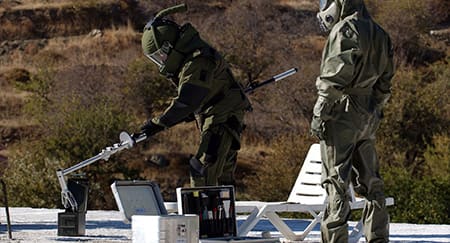NATO’s Multinational Chemical, Biological, Radiological and Nuclear (CBRN) Defence Battalion is both an effective solution to a capabilities shortfall and a model for future NATO transformation.
The high-readiness, multinational unit not only adds to NATO’s credibility in dealing with the growing threat posed by weapons of mass destruction, but also presents a path for improving Allied force-generation and defence-planning processes in the future.
“The Battalion presents a model of how NATO’s transformation can go,” says Lieutenant-Colonel Rainer Bürling from the Nuclear, Biological and Chemical (NBC) branch of the Plans and Policy Division of NATO’s International Military Staff. “If current progress can be maintained, the Battalion may be used as a prototype of how to develop new joint Allied capabilities, conduct joint training and evaluate lessons learned.”
The essential mission of the Multinational CBRN Defence Battalion is to provide NATO joint forces and commands, wherever deployed, with a rapidly deployable and credible defence against nuclear, biological and chemical attacks. In practice, this means providing the NATO Response Force with the full spectrum of NBC defence, including the capability to conduct consequence-management operations in the event of attacks with weapons of mass destruction. As a secondary assignment, the unit may also be committed to assisting civilian authorities of Allied nations as during the 2004 Olympic and Paralympic Games, where elements of the Battalion were deployed to Halkida, Greece, as part of NATO’s efforts to provide CBRN assistance to the Greek government.
The Battalion comprises a Headquarters Company, a Joint Assessment team as well as a Nuclear-Chemical Reconnaissance Company, a Biological Detection Capability and a deployable NBC Analytical Laboratory. These capabilities enable the Battalion to perform NBC reconnaissance operations and provide mobile collection and analysis facilities needed for on-the-spot confirmatory identification of NBC substances, not least chemical and biological warfare agents. This, in turn, enables the Battalion to provide in-theatre NBC assessments and advice to NATO commanders. The Battalion also includes light and heavy decontamination companies making it capable of performing decontamination operations.
Efforts to improve Allied capabilities in the areas of NBC defence date back to the Prague Summit in November 2002, where the Allies endorsed five nuclear, biological, chemical and radiological weapons defence initiatives as part of the Prague Capabilities Commitment. Specifically, the CBRN Defence Battalion represents an acceleration of the decision taken at Prague to enhance Alliance capabilities to build a prototype NBC response team and a prototype deployable NBC Analytical Laboratory.
The decision to form the Battalion was taken at the June 2003 meeting of NATO defence ministers in Brussels. In December 2003, an initial operational capability was achieved as the Battalion was launched in the Czech Republic. After six months of NATO certification and training the Battalion was declared “fully operational” at the Istanbul Summit in June 2004. At the same time, the CBRN Defence Battalion became part of the six-month rotation of the NATO Response Force.
The operational concept of the Multinational CBRN Defence Battalion is based on the principle of rotating commands. This means that just like the NATO Response Force, the Battalion is not a single standing force. Rather, it is comprised of different units and sub-units from across Allied nations that each serve for a fixed period under the leadership of a lead nation.
The lead nation provides core headquarters staff and is responsible for command and control arrangements, maintaining standard operational procedures, sustaining readiness levels and for planning and conducting collective training. Contributing nations supply functional capabilities. This includes providing requisite troops, equipment and logistical support in accordance with mission requirements.
Germany took over responsibility as lead nation from the Czech Republic on 1 July 2004. On 1 July 2005, Spain became the CBRN Defence Battalion’s third lead nation.

